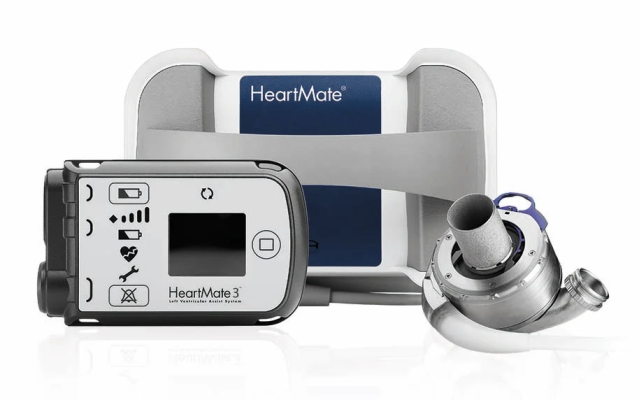
May 15, 2024 — The U.S. Food and Drug Administration (FDA) announced that Abbott is recalling the HeartMate 3 LVAS by updating the instructions for use after complaint reviews identified blood leakage or air entering the seal interface between the left ventricular assist device (LVAD) inflow cannula and the titanium apical cuff. In all reported events, the issue was observed during implantation of the device.
The FDA has identified this as a Class I recall, the most serious type of recall. Use of these affected devices may cause serious injuries, serious health consequences, or death. Please be aware, this recall is a correction, not a product removal.
Recalled Product
- Product Name: HeartMate 3 Left Ventricular Assist System Implant Kit
- Product Codes: See Recall Database Entries:
- Devices Recalled in the U.S.: 882
- Dates Distributed: March 1, 2021 to present
- Date Initiated by Firm: March 13, 2024
Device Use
The HeartMate 3 Left Ventricular Assist System (LVAS) is used to help the heart pump blood when it is not able to do so effectively on its own. The HeartMate 3 is used for both short- and long-term support in pediatric and adult patients with severe left ventricular heart failure. It can be used while waiting for a heart transplant, to help the heart recover, or as a permanent solution when a transplant isn't an option.
HeartMate 3 LVAS takes over the pumping function of the left ventricle, the main pumping chamber of the heart. It diverts blood from the weakened left ventricle and propels it into the body's main artery, the aorta, helping to circulate blood throughout the body. The device is used both inside and outside of the hospital.
Reason for Recall
Abbott is recalling the HeartMate 3 LVAS after complaint reviews identified blood leakage or air entering the seal interface between the left ventricular assist device (LVAD) inflow cannula and the apical cuff. In all reported events, the issue was observed during implantation of the device.
Blood leakage or air entering the LVAD from this location will impact the integrity of the blood flow and may lead to longer than expected surgery, bleeding (hemorrhage), right heart failure, or air embolism. Use of these devices may cause serious injury or death.
Abbott reports 81 incidents, including 70 injuries and two deaths related to this issue.
Who May Be Affected
- Patients who need cardiac support using the HeartMate 3 LVAS System.
- Health care providers who plan to use the HeartMate 3 LVAS System for their patients.
What to Do
On March 20, 2024, Abbott issued an Urgent Medical Device Correction Notification letter to customers recommending the following actions:
- Do not return unused product as the product is not being removed from the field.
- If blood leak or air entrainment is suspected or observed, follow standard surgical processes and the existing instructions for use (IFU)
- Residual air must be completely evacuated from the device blood chamber prior to initiating the LVAD support.
- Ensure that bleeding is assessed and ensure proper management of hemostasis before closing all wounds.
- Use conventional strategies for resolving air leaks or surgical bleeding, including: adjusting the pump position, waiting for the natural tendency of blood to coagulate or upon reversal of anticoagulation, adding surgical materials, and exchanging the apical cuff, the pump, or both.
- Always have a complete backup system (implant kit and external components) available on-site and in close proximity during the implantation procedure for use in the event of an emergency.
- Distribute the notice to those who need to be aware within the institution.
- Complete the acknowledgment form included with the letter and return it to Abbott at [email protected].
Contact Information
Customers with questions should contact their local Abbott representative or call 612-346-3514.
Additional Resources
- Medical Device Recall Database entries:
How do I report a problem?
Health care professionals and consumers may report adverse reactions or quality problems they experienced using these devices to MedWatch: The FDA Safety Information and Adverse Event Reporting Program using an online form, regular mail, or FAX.


 February 03, 2026
February 03, 2026 









